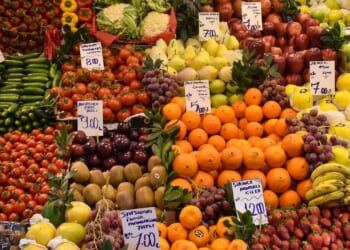British food is often referenced as an excuse to deny the value, if not the existence, of British culture. This, ironically, is one of the blandest and sloppiest opinions around. It’s easy to give in to the temptation to engage in doomerism and everything-is-crap-ism about a great number of things in Britain. But if you want to break the habit of pessimism about Britain, the best place to start is the dinner plate.
British food is world-beating. We are an island paradise of rich and verdant countryside, surrounded with seas and crisscrossed with rivers and streams teeming with fish. We have beef and lamb prized all over the world. Unlike countries like the United States that have readily embraced the socialism of the commons, Britain is a success story of private property as well as the profit motive as a motor for conservation and for the very long-term health of the countryside. If our hedgerows are today alive with the kind of biodiversity that gets green campaigners hot under the hemp collar, it’s because private landowners prized them as cover for pheasant and partridge where a government central planner would have long ago had them torn out in the name of efficiency. Anglers travel from all kinds of exotic, far-flung parts of the world and pay vast sums of money for the opportunity to fish a beat on our unique chalk streams.
I spend a fair amount of time chatting to game hunters in the South of France, and it is a common experience to see a chasseur’s eyes light up talking about the dream of one day being able to experience the ultimate prize of driven game in an English field or of course, better yet, of wild grouse on a Scottish moor. If you’re ever feeling weary of weekends in the city after a week of commuting, you should ask around and find a day of beating on a game shoot a train ride away. To walk a hedgerow or to fight your way through brambles is to appreciate the bounty of Britain’s countryside.
Britain is a country that cares deeply about its animals. For example, despite the increased costs and difficulty, an estimated 40 percent of breeding sows in the UK are kept outdoors versus single digits in France, Germany, and Denmark.
There is also much to celebrate in the role that consumer choice rather than government regulation has helped to improve welfare — increased preference for free-range eggs is a win-win for the consumer and for the battery chicken, though perhaps my most Marxist belief is that we should become much more tolerant of paying far more for a pint of milk given the labour that goes into producing it.
Granted, British food may have suffered from a low ebb for a period of time. There are perfectly mundane reasons for this. Britain industrialised long before its neighbours, and millions of its workers left the field for the factory more than half a century before their European peers. It was far easier to procure fresh meat and veg for the pot in rural Worcestershire or Lancashire than in industrial Birmingham or Manchester.
There is a common idea that perceptions of poor quality British food are a hangover from the post-Second World War rationing era. Yes, this era carried on a lot longer than one might have reasonably expected. Rationing ended completely in 1954 — a full nine years after the war ended (yet another lesson in how reluctant governments are to relinquish central planning when granted powers in exceptional circumstances). But despite Britain being the last of the major belligerents of WWII to end rationing, British restaurants serving local ingredients have been awarded Michelin stars since before the first Thatcher government. I think the importance of this influence is overemphasised and unhelpful. We have no shortage of ingredients needed to cook great food, and we do not want for great chefs.
But there are other reasons we are often so quick to shrug when our national cuisine is slandered. “Chicken tikka masala is Britain’s favourite dish”. If you lived in the UK under Tony Blair, you’ve almost certainly heard that stated dozens of times. Even if you didn’t, you’ve almost certainly heard it as part of a vignette about the Great Melting Pot of Modern Britain. As far as propagandistic statements go, it is remarkably effective. It’s hard to take umbrage with something so innocuous without sounding like a bit of a nutter (or much worse, much more grave – a Little Englander). It speaks to a modern, vibrant Britain; one that has thrown off the stodgy mundaneness of its native cooking and embraced the exotic — and with it, the excitement of those that can show us how to stew meat with spices.
The only stumbling block is that it isn’t particularly true and its position in the national zeitgeist derives indirectly from a rhetorical gobbet spat out of a speech given by then Foreign Secretary Robin Cook in 2001. If you have a few minutes to spare, it’s worth reading the whole thing. Like a concoction from a 1970s microwave cookbook, it’s hard to believe this stuff was ever appetising, but this was the kind of slop being served up under the first Blair government.
At its heart is the very familiar idea that because there was some form of European migration into Britain in the last two millennia, that there is no real coherent English or British identity. It conjures up images of benevolent Italians arriving in Britain with pizza and pasta recipes, rather than an occupying force that withdrew after revolt following centuries of resistance. While the Roman elite built villas and drank imported wine, excavations at an early Christian cemetery discovered outside Poundbury in Dorset revealed 1,200 remains of ordinary Britons, their bones showing signs of long-term malnutrition and a life of hard labour. Clearly, they weren’t opening chains of Bella Italia. A handful of Norman bishops here, and a degree of internationalism among a tiny handful of the ruling elite there, and it is reasoned we should enjoy our chicken tikka and accept a large degree of immigration “because it is a perfect illustration of the way Britain absorbs and adapts external influences”. It should be noted that since this speech, at least 15.9 million people have immigrated to Britain, based on ONS and related estimates. This increased the foreign-born population from 8.3 percent in 2001 to over 17 percent by 2024, with significant contributions from non-EU countries post-2021. Forget Romans, Saxons, and Huguenots that arrived and often left — Britain has changed more profoundly for more of the population during the last decade of immigration than it ever has been changed in its history and all while we are told that at least we have gained in new cuisine.
Reject the selfie outside Nobu. Embrace the Scottish salmon as the Rolex of fish
But who cares what people choose to eat? Some may argue de gustibus non est disputandum, and having spent a great number of hours of my school days trying my best to nap through the adventures of Grumio and Melissa, I can confidently say that loosely translates as “the people don’t know what’s best and should look to The Critic to guide them”. Despite having previously dismissed the influence of Romans in Britain, I am very much inclined to agree. It’s easy to be made to feel a little petty and déclassé talking about British beef and lamb and pies and cheese. We’ve seen enough “gammon” insults thrown by people who think that being ripped off for an omelette complète and soggy chips in Montmartre is the height of sophistication to be reluctant to speak up. But to believe in British pork chops and lamb shanks helps to nourish you not just in body but in mind. We should be unselfconscious about championing what our agricultural and cultural heritage has given us. Maintaining the freedom to fish our own seas and the motive to preserve their long-term health shouldn’t be given up merely in the hope of some EU goodwill. Small farms are not just a piggy bank to be smashed open by a Labour government — with centuries and generations of work and care for the soil and the crop liquidated to finance a few minutes of inner city housing. British culture is not tasteless and bland unless it is corrupted and covered up with something new and more socially acceptable.
Reject the selfie outside Nobu. Embrace the Scottish salmon as the Rolex of fish. Enjoyed watching Clarkson’s Farm? The great news is that there are thousands of farms all over Britain, and they’ll probably let you take a photo in their farm shop without queuing for an hour.
Seek out the British restaurant, make friends with the butcher, marvel at the suet pudding, and let beef and liberty be our reward.







